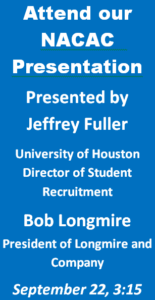Let’s hear it for College Admission Road Warriors!
 All over the country, college reps are contacting high school counselors, hosting meet & greets with college-bound seniors, presenting at college fairs, pulling together promotional materials and visiting 100+ high schools in way too few days. For admission counselors, it is Travel Season and it can be stressful and relentless. But, is it productive?
All over the country, college reps are contacting high school counselors, hosting meet & greets with college-bound seniors, presenting at college fairs, pulling together promotional materials and visiting 100+ high schools in way too few days. For admission counselors, it is Travel Season and it can be stressful and relentless. But, is it productive?
Here are a few Travel Season Tips that will help you differentiate your college or university, have meaningful interactions with prospective students and ensure a very rewarding travel season.
That great pitch you have prepared? Put it away!
Many counselors have a canned presentation at-the-ready that lists of all the super features their school has to offer? If you have one, set it aside. Features are only benefits when the person hearing them sees value in them. How do you know which special attributes of your institution will be meaningful to a student? You ask the right questions.
When you are asking questions and getting acquainted with the student you are also doing the one thing that will truly distinguish your college from all others. Can you guess what that is?
The answer is: Taking (and showing) a personal interest in the prospective student.
If you are thinking that is too simple, or that most colleges do this already, two-thirds of prospective students will disagree with you. In truth, college-bound students say that the majority of the colleges they communicated with during the college shopping process never took a personal interest in them at any point in the recruiting process. In our nationally co-sponsored study, “The Excitement Factor,“ 12,000 college-bound students told us that the college’s personal interest in them, or lack of it, was influential in their college selection decision.
And, as a practical matter, the more personal interest you take in a student the more you will find out about his or her unique combination of interests, preferences, desires, anxieties, and aspirations. With that greater understanding you will naturally communicate a unique value proposition. The student will perceive you as distinctive among their available choices. You will have reached the coveted state of differentiation.
The best conversations start with these questions.
Every admissions counselor has an arsenal of questions that they ask prospective students during the school high school visit. We suggest that you replace those with the type of questions that will begin the process of building relationships. These topics are great discussion-starters for group sessions, too.
- Picture your ideal college. Tell me about it.
- What excites you about going to college?
- Is there anything that concerns you about college?
- What are your interests outside of school?
- Right now what college interests you the most? Why?
- Do you see anything getting in the way of going to college?
- Why are you most interested in biology/communications/whatever?
- How would you like me to communicate with you? May I text you?
The best admissions representatives paint a picture of what the college experience will be like. And they do that in a way that is personalized to the student. The right questions will help you paint a compelling picture.
You can be “The Go-To Person.”
You can and should be the key person that a student can count on to provide anything they need related to your college or university. Tell the students you are recruiting, “I’m your college information source. If you need something, if you have a question, if you are worried about something, text me.”
In our most recent co-sponsored study, “The Relationship Dynamic,” college-bound students told us that they are most likely to build a relationship with an admission counselor who is knowledgeable and responsive. They most appreciate the counselor who knows the answers to every question about their school, campus, costs, loans, scholarships, etc… And, if they are asked a question that they don’t have an answer for, they promise to find out fast.
A key member of your team: High school guidance counselors.
Guidance counselors are crucial influencers for college-bound students and they can be one of your best assets. Unfortunately, they are often the most overworked and underappreciated educators on the team. In most high schools, the guidance counselors wear many hats and guiding seniors through the college search process is just one of the many goals they need to accomplish each day.
Help them do their job and they will help you do yours. Here’s how:
First, do your homework
Before you arrive on campus, learn all you can about the school you are visiting. You should be able to identify strengths that match up well to your college or university. The high school has an award winning band/art/science program? Perfect! Your college just happens to have one the best programs in that particular area in the state/region/country.
Don’t just concentrate on the high school’s strong points, though. Make note of what is missing from the school’s offerings and fill that gap. Good counselors often know of students who have special talents or interests in areas that aren’t being served at the high school level.
Stand out from the crowd
If you want your voice to be heard, be sure you are not saying the SAME thing as every other college rep they hear from. Yes, all those facts about your school are important; class size, top majors, new buildings, etc., but your face time with the counselor needs to concentrate on things that can’t be read about in a handout or on your website.
Focus instead on those attributes that make your college unique. Perhaps it is your “Great Books” program for avid readers, your acclaimed science department with the state-of-the-art labs, or your dynamic career services facility. What special niches can you fill? Find out with questions such as:
- Are there specific college programs that would interest some of your students that you have had a hard time finding?
- Do you have a student with particular passion we might be able to help?
- How can I make your job easier?
High school counselors enjoy hearing (and often sharing) stories of successful placements. When possible, update them on some of their former  students who are now enjoying college life at your school. Offer specific examples of students from all walks of life who have flourished in their new college environment.
students who are now enjoying college life at your school. Offer specific examples of students from all walks of life who have flourished in their new college environment.
Stay Top of Mind
Follow up and follow through. Showing your appreciation with a handwritten thank you note will make you memorable and is an opportunity to highlight the unique values of your college. Keep notes about specific areas of interest you have uncovered in your conversation and follow up via email with any relevant news. Involve department heads and key administrators in sending personal notes about new developments on campus.
There are communication techniques your staff can learn that will help them feel confident about reaching out to prospective students to ask the right questions. This is one of the core techniques we teach in the Interactive Counselor Training Workshops we hold on college campuses throughout the country. It is also a key component of YES, our Yield Enhancement Tool. Let me show you how we can help you. Please call or email me for more information. Continue the conversation on Twitter @LongmireCo. Be sure to Subscribe to Versions of Conversion today so you don’t miss any of this highly-valuable information.
 Rick Montgomery is as an Enrollment Strategist at Longmire and Company. With over 20 years in higher education marketing, he brings an innovative and dynamic approach to helping colleges and universities meet their enrollment goals. Rick can be reached at 913/492.1265 x.708 or via email at rmontgomery@longmire-co.com.
Rick Montgomery is as an Enrollment Strategist at Longmire and Company. With over 20 years in higher education marketing, he brings an innovative and dynamic approach to helping colleges and universities meet their enrollment goals. Rick can be reached at 913/492.1265 x.708 or via email at rmontgomery@longmire-co.com.

